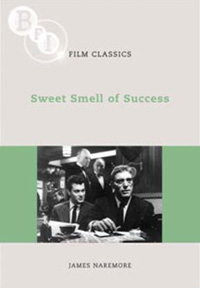(Palgrave Macmillan/BFI, 96 pages, $15)
By James Naremore
 We now think of Alexander Mackendrick’s Sweet Smell of Success—a major flop in its day—as one of the key American movies of the late 1950s. The film is a toxic and exhilarating depiction of media corruption linked thematically with Citizen Kane, A Face in the Crowd, Ace in the Hole, and Network, and it’s their equal in cynicism and pessimism. But James Naremore, master of contextualization (his best book is More Than Night: Film Noir in Its Contexts) sees beyond Mackendrick’s crisp direction, Clifford Odets’ and Ernest Lehman’s stinging dialogue and the image-shattering performances of two huge stars—Burt Lancaster and Tony Curtis—in deeply unedifying roles as monster columnist J.J. Hunsecker and his dancing-rat acolyte Sydney Falco.
We now think of Alexander Mackendrick’s Sweet Smell of Success—a major flop in its day—as one of the key American movies of the late 1950s. The film is a toxic and exhilarating depiction of media corruption linked thematically with Citizen Kane, A Face in the Crowd, Ace in the Hole, and Network, and it’s their equal in cynicism and pessimism. But James Naremore, master of contextualization (his best book is More Than Night: Film Noir in Its Contexts) sees beyond Mackendrick’s crisp direction, Clifford Odets’ and Ernest Lehman’s stinging dialogue and the image-shattering performances of two huge stars—Burt Lancaster and Tony Curtis—in deeply unedifying roles as monster columnist J.J. Hunsecker and his dancing-rat acolyte Sydney Falco.
Taking the long view, Naremore sees Sweet Smell as the termination point of 1930s “Popular Front” optimism (typified by Odets’ early plays), the climax of pure film noir (James Wong Howe’s glittering nighttime cinematography), and as an early strike back against the dying embers of McCarthyism. The red-baiting senator, censured by his colleagues, died in disgrace shortly before Sweet Smell was released, while right-wing columnist Walter Winchell, the basis for Hunsecker, was losing his hitherto iron grip on his audience.
Mackendrick, Odets and Lancaster piled on mercilessly, exposing for the first time in an American movie McCarthyism’s contemptuous manipulation of the press to smear political and personal opponents. Mackendrick, whom some Guild members will recall fondly from his later role as a film professor at CalArts, was in a tough spot: he was a serious U.S.-born Scotsman faced with the mercurial, booze-sodden, freespending libertines at Lancaster’s pioneering independent production company, Hecht-Hill-Lancaster. Mackendrick’s discipline won out on the set even when Lancaster literally picked fistfights with him. More importantly, Mackendrick prevailed in the editing room where the director’s cut finally won over the skeptical HHL board.
Few critics can do a close-read of a movie as well as the sharp-eyed Naremore, and his examination of the film’s narrative brings out all its contradictions and complexities, while also noting its occasional flaws. His book makes Sweet Smell of Success seem like a heroic victory over its producers’ own worst instincts, and an even more remarkable achievement than we already thought it was.